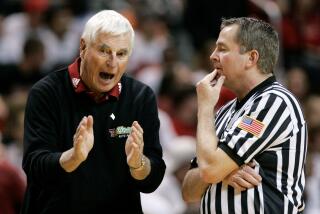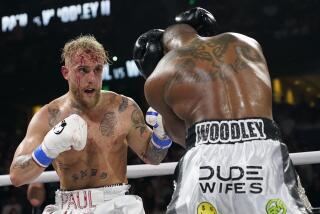To Be or Not to Be Misquoted
- Share via
It has come to the attention of Elizabethan literary scholars that one of their eminent colleagues, the Rt. Hon. Michael Tyson, Esq, has taken to the public prints to misquote--perish the thought!--Shakespeare.
Michael got his tongue twisted when he was trying to chastise another world-class author, the quondam light-heavyweight boxing champion of the world, Jose Torres, for scandalous references in print to Tyson’s notions of safe sex (hit her with the best punch you ever threw).
While it’s refreshing to find a heavyweight champion of the world who reads Shakespeare--Tyson is the first since Gene Tunney--there are those of us who suspect a bit of ventriloquism here.
Just as there are some people who think Shakespeare didn’t write Shakespeare, there are some who think Tyson didn’t quote him.
Don King gets the nod as the man behind the curtain here. Don, you see, is Tyson’s consultant, adviser and running mate.
And, Don, it is well known, became a world-class litterateur in the period (several years) when he was a regular customer at the Ohio State penitentiary library.
Don can quote Shakespeare at the drop of a lunch check, particularly if it speeds up negotiations. In Don’s favor.
It’s inevitable Don would weigh in with a malapropism or two--even the college professors have to look up Bartlett’s Quotations from time to time--but what Don had Michael saying was a Bartlett’s Misquotations.
Speaking of Author Torres, the champ said, “I think it was Shakespeare (Note: this is fine pedantic form; even when you’re positive, in academic circles, modesty--and diffidence--demands you throw in this disclaimer) who said, ‘I love the act of treason but I hate the traitor.’ ”
Well, of course, it doesn’t matter what Mike thinks. It was Julius Caesar who (according to Plutarch) said that.
It’s not a serious mistake, to be sure. It’s not as if Don King, who would like to be Tyson’s manager if only Bill Cayton would step aside and stop getting injunctions, put collodion in Mike’s eyes between rounds or matched him with somebody who could fight back.
Still, it opens up whole new vistas for the once and future heavyweight king. Now that Olivier’s gone, he can become the world’s foremost spouter of Shakespeare and can find that the Bard had something to say about every human experience. It’s just a matter of having Don King sort them out for him.
Take the following, for example:
“What is she but a foul contending rebel, And graceless traitor to her loving Lord? I am ashamed that women are so simple To offer war where they should kneel for peace Or seek for rule, supremacy, and sway Where they are bound to serve, love and obey.” Now, the great Will wrote that about Kate, the untamed shrew, but Mike might want to apply it to his dear, departed Robin, mightn’t he?
“Upon what meat doth this our Caesar feed, That he is grown so great? Age thou art shamed! Rome, thou has lost the breed of noble bloods!” This, of course, could apply to Mike himself. If not, certainly to Bo Jackson.
“Let me have men about me that are fat “Sleek-headed men and such as sleep o’nights. “Yound Cassius has a lean and hungry look; “He thinks too much: such men are dangerous.” This could refer to, in order, (1) Don King and (2) Bill Cayton--except when the Bard wrote “sleek-headed,” he didn’t exactly have Don King in mind.
“Beggars mounted run their horses to death.” This could apply to any of Mike’s fellow pugs who earned millions but died broke.
“A gentleman that loves to hear himself talk, and will speak more in a minute than he will stand to in a month.”
Once again, the great Will seems to have anticipated Don King.
“Mislike me not for my complexion, “The shadow’d livery of the burnished sun.”
This piece of Shakespearean advice (from “The Merchant of Venice”) stands alone.
“O God! That men should put an enemy in their mouths to steal away their brains; that we should with joy, pleasance, revel and applause, transform ourselves into beasts.”
For any athlete who gives up a career for crack, who sells his birthright for a mess of pot.
“We still have judgment here; that we but teach “Bloody instructions, which, being taught, return “To plague the inventor; this even-handed justice “Commends the ingredients of our poisoned chalice “To our own lips.” The Oklahoma football program?
“O! That this too too solid flesh would melt “Thaw and resolve itself into a dew.” For a Tommy Lasorda for whom thin is win.
“My library “Was dukedom large enough.” Don King again.
The scholar Tyson could have some advice from Stratford-Upon-Avon for the sorely beset baseballer, Pete Rose:
“The world is not thy friend nor the world’s law.” And:
“The purest treasure mortal times afford “Is a spotless reputation.”
The Greeks might have had a word for it, but the Bard had a paragraph. As for sportswriters, Will had the words for them, too:
“He jests at scars that never felt a wound.”
More to Read
Sign up for our Book Club newsletter
Get the latest news, events and more from the Los Angeles Times Book Club, and help us get L.A. reading and talking.
You may occasionally receive promotional content from the Los Angeles Times.










